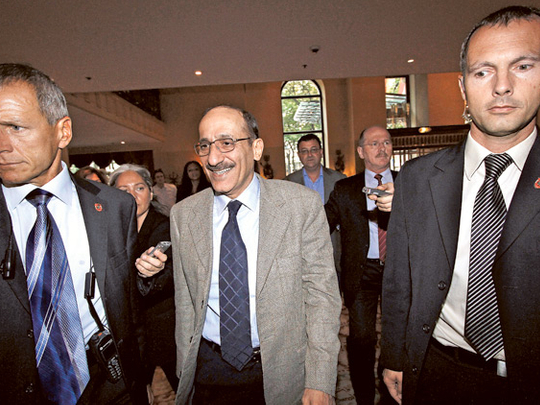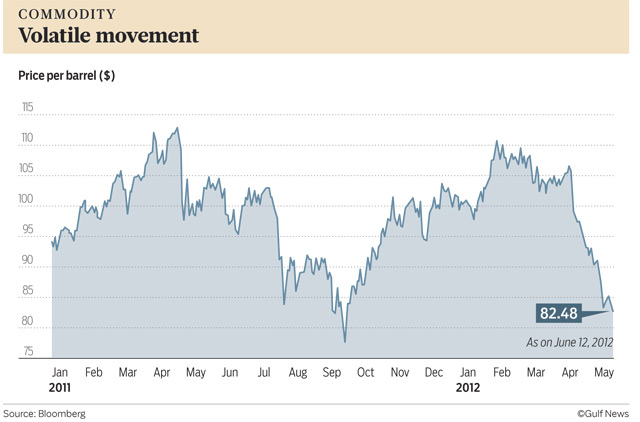
Singapore: Oil fell a fourth day after Saudi Arabian Oil Minister Ali Al Naimi said the Organisation of Petroleum Exporting Countries (Opec) may need a higher output quota and the US issued more exemptions from sanctions for buying Iran’s crude, reducing the risk of supply disruption.
Futures slid as much as 2 per cent after closing at an eight-month low on Monday. Opec “maybe” needs to raise its production ceiling above 30 million barrels a day, Al Naimi said in Vienna on Monday. The US added six countries and Taiwan to its list of exemptions, saying they “significantly reduced” their purchases of Iranian crude. US petrol stockpiles probably climbed to the highest level in five weeks, a Bloomberg News survey showed.
“The comments from Monday are surprising and suggest Saudi Arabia isn’t willing to reduce production,” Carsten Fritsch, an analyst at Commerzbank AG in Frankfurt, said by phone. “Without a production cut, there will be oversupply in the market in the second half, which will put further pressure on prices.”
Oil for July delivery dropped as much as $1.63 to $81.07 a barrel in electronic trading on the New York Mercantile Exchange and was at $81.55 at 8:58 a.m. London time. The contract declined 1.7 per cent to $82.70 on Monday, the lowest close since October 6. Prices are down 17 per cent this year.
Brent oil for July settlement slipped $1.10, or 1.1 per cent, to $96.90 a barrel on the London-based ICE Futures Europe exchange. The European benchmark contract’s premium to West Texas Intermediate widened to $15.43 a barrel, compared with $15.30 Monday.
OPEC Meeting
WTI extended losses after a so-called bearish engulfing pattern formed on the daily candlestick chart, a tool used by technical analysts to predict price moves, according to data compiled by Bloomberg. Crude’s 50-day moving average, at $96.42 a barrel yesterday, erased its premium to the 200-day mean, signalling a possible “dead cross” formation. Investors typically sell contracts when a shorter moving average falls below a longer one.
Saudi Arabia’s analysis suggests OPEC needs a higher production ceiling, the Gulf Oil Review cited Al Naimi as saying in a June 2 to June 3 interview. The minister, who arrived in Vienna on Monday, responded to the article by telling reporters that he said “maybe” the quota needs to be increased.
Opec, which supplies 40 per cent of the world’s crude, meets in the Austrian capital June 14 to decide on output levels for the second half of the year. Its 12 members exceeded the ceiling by 1.9 million barrels a day in April, according to the International Energy Agency. Saudi Arabia, the world’s biggest crude exporter, has pumped more than 9.5 million barrels a day since June 2011, the longest stretch for at least 11 years, data from the US Energy Department show.
Iran Sanctions
The US added India, Malaysia, South Korea, South Africa, Sri Lanka, Turkey and Taiwan to the list of exemptions from sanctions after they reduced crude purchases from Iran, US Secretary of State Hillary Clinton said Monday in an emailed statement. Clinton announced in March that Japan and 10 European Union nations had qualified for an exemption for a renewable period of 180 days.
India and South Korea were the third- and fourth-largest buyers of Iran’s crude in the first half of last year, according to the US Department of Energy. China, Iran’s biggest customer, and Singapore, Asia’s oil-trading hub, weren’t exempted from the sanctions, which are targeted at curbing Iran’s nuclear programme.
‘Constructive Discussions’
Singapore and the US are “having constructive discussions” on the Iranian crude imports and an exemption, the city-state’s Ministry of Foreign Affairs said in a statement. Iran represented 1 per cent of Singapore’s overseas purchases in the past two years and in May no oil from Iran was shipped in, according to the ministry.
Countries have until June 28 to demonstrate they have “significantly reduced” purchases from Iran, Opec’s second-biggest producer, or their banks that settle the oil trades may be cut off from the US financial system.
US petrol inventories rose 1.5 million barrels last week to 205 million, the highest level since the period ended May 4, according to the median estimate of seven analysts surveyed by Bloomberg News before an Energy Department report today. Crude stockpiles probably dropped by 1.5 million barrels, the survey showed.













